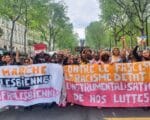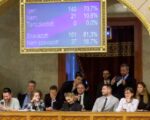>> Ukraine refuses to back European hate crimes law
[spacer]
L’Ukraine a refusé ce jeudi 17 novembre de ratifier une convention du Conseil de l’Europe sur « la prévention et la lutte contre toutes les formes de violence à l’égard des femmes », de nombreux députés jugeant le texte « inacceptable », parce qu’il incluait les discriminations notamment fondées sur « l’orientation sexuelle et l’identité de genre ».
Après un débat houleux, ce dernier point ayant particulièrement divisé l’Assemblée, il a été décidé, après vote, de renvoyer le projet en comité, précise l’AFP, afin qu’il soit retravaillé, avant d’organiser un nouveau scrutin.
Dans cet État d’Europe de l’Est, où l’Eglise orthodoxe a une forte influence dans le centre, l’est et le sud, et l’Eglise gréco-catholique, dans l’ouest, l’homosexualité, qui était encore punie par la loi à l’époque soviétique, y reste largement stigmatisée.
La troisième Pride de l’histoire de l’Ukraine indépendante a rassemblé en juin près de 700 militants, qui ont défilé « protégés » par plusieurs milliers de policiers dans le centre de Kiev.
« Nous devons accepter de nombreuses valeurs européennes, mais certainement pas celles qui bafouent les fondements du christianisme », a déclaré Iouri Soloveï, un député du parti du président Petro Porochenko.
Ces déclarations ont provoqué l’indignation d’organisations de défense des droits des LGBT, dont « Fulcrum », qui déplore que l’interdiction de battre une femme ne soit limitée qu’aux hétérosexuelles. Bogdan Globa, fondateur et directeur exécutif de l’association, dénonce un recul pour le pays mais regrette par ailleurs un signal envoyé à l’Europe : « notre pays ne partage pas les valeurs de l’Union, relatives aux questions de lutte contre les discriminations. »
Cette convention, qui a un effet direct sur l’égalité entre les femmes et les hommes, a été adoptée par le comité des ministres du Conseil de l’Europe le 7 avril 2011 et signée par la France le 11 mai suivant.
Joëlle Berthout
stophomophobie.com
[spacer]
>> Ukraine’s parliament today (17 November) refused to back a European hate crimes law because its references to sexual orientation and gender violated what many lawmakers said were basic Christian values.
Parliament had been due to vote on the ratification of the Council of Europe Convention on preventing and combating violence against women and domestic violence.
The so-called Istanbul Convention characterises domestic abuse and discrimination based on sexual orientation as violations of human rights.
It was adopted by the Strasbourg-based Council of Europe rights body in 2011 and has been ratified by more than 20 states.
But the former Soviet republic remains a deeply conservative country where Gay Pride parades are often either banned or met with violence from far-right thugs.
Work on the first draft of Ukraine’s legislation was delayed and from now on will include members of the conservative Council of Churches.
« The draft law on preventing and combatting violence will exclude references to « gender » and « sexual orientation », » Ukraine’s parliament said on its Twitter account.
The short statement came after a high-decibel debate between lawmakers over what constituted Ukraine’s moral values.
« The bill is filled with things that are unacceptable to our society, » populist Radical Party member Igor Mosiychuk said.
Another parliament member said the mainly Christian Orthodox country should base its values on religious standards that condemn things like gay marriage.
« The only matter we should be paying attention to is the position of the Council of Churches, » the loosely pro-Russian Opposition Bloc deputy Yuriy Miroshnychenko said.
Pro-Western President Petro Poroshenko – a fierce foe of Russia whose forces are fighting a 31-month pro-Moscow eastern separatist war that has claimed nearly 10,000 lives – has not said whether he backs the original version of the bill.
But a member of the president’s party said he also opposed the Istanbul Convention in its current form.
« I agree that we must accept many European values – but certainly not the ones that violate the bases of Christianity, » said Yuriy Solovey of the Petro Poroshenko Bloc party.
Parliament has not yet scheduled a new hearing and no timeframe for any version of the convention’s ratification has been set.
The chamber is led by the pro-EU parties of Poroshenko and Prime Minister Volodymyr Groysman.
But some of their members and the more nationalist and populist groups that also comprise parliament rarely adopt unpopular legislation demanded from abroad without putting up a fight.
It remains unclear how the Council of Europe will respond if Ukraine eventually ratifies a far more conservative version of the convention that omits some of its basic principles.

















